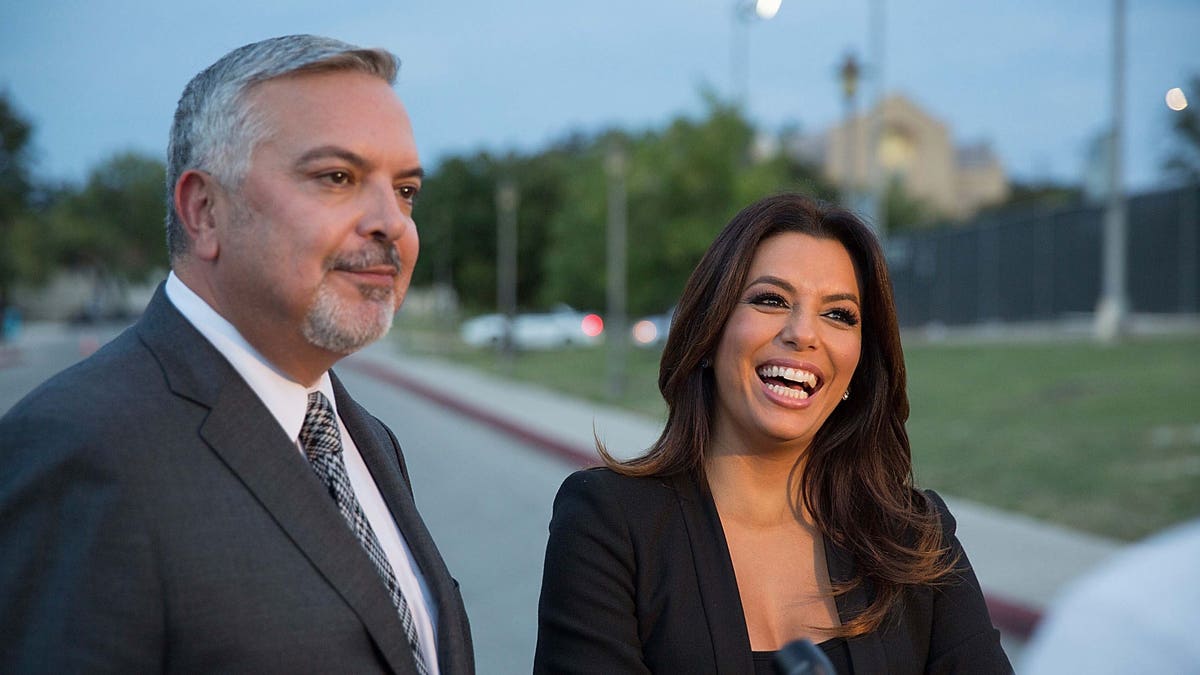
Henry R. Munoz, III, Latino activist and advocate and Eva Longoria, actor, director, producer and activist are looking to help fill the void for Latino political donations with the Latino Victory Fund. (Photo by Rick Kern/Getty Images for Latino Victory Project) (2014 Getty Images)
Just months after a midterm election that saw Republicans win big on Capitol Hill, fundraising season has kicked into high gear in the Washington, D.C.
Every week, the district’s nightlife is peppered with closed-door, off-the-record events aimed at raising money for candidates running for office in next year’s election cycle. While private fundraising events are hardly new to Washington culture, one group wielding influence as never before are the Beltway’s Latino elites.
Oscar Ramirez is a principal at Podesta Group, a Washington lobbying firm, and one of the Democratic Party’s top Latino donors. During last year’s midterm election cycle, Ramirez donated over $83,000 to political campaigns.
“The overwhelming majority of my political contributions are to Hispanic candidates and electeds,” Ramirez said. “Unfortunately, for many of the people I support, their biggest challenge is often that they lack access to the financial resources they need to win their campaigns. I donate because I am in a position to make a difference.”
Although Latinos are becoming a strong political force in Washington, they are finding a tough time getting financial backing. Latinos make up 16 percent of the U.S. population, they own only 2.2 percent of the nation’s wealth. That wealth gap between Hispanics and whites was only exacerbated by the 2008 recession, which saw Hispanic households lose a larger share of their net worth than any other racial group, according to a 2011 report by Pew Research.
- Eva Longoria, Powerhouse In Politics As Well As In Hollywood
- Eva Longoria Launches New Project To Boost Latino Candidates And Voting Power
- Henry Munoz, Influential Texas Money Man, Tapped as Next DNC Finance Chair
- New DNC Finance Chair Henry Munoz III Calls Appointment a ‘Milestone’
- Obama Inauguration: Latinos Take On Key Role
- I Want to Be Eva Longoria!
- Mexicana Flight Attendants Turned Calendar Girls Feud after Success
- Eva Longoria: Glamour Transformation
This makes political fundraising in the Hispanic community challenging.
One group looking to help fill the void for Latino political donations is the Washington, D.C.-based Latino Victory Fund. The group, which was founded by Eva Longoria and San Antonio entrepreneur Henry Muñoz, will roll out a three-pronged approach this year to target what they see as the potential Latino donor segments: high net worth individuals, middle-level donors – which the group hopes will number 100,000 – and grassroots donors who can give in small amounts.
“Latinos as a group are fairly new to electoral participation,” says Cristobal Alex, president of the Latino Victory Project. “Many Latinos have never been asked to give. We’re the group that’s going to make that initial ask.”
A Latina who is often asked to give is Cristina Antelo.
Like Ramirez, Antelo is a principal at Podesta Group and was a major political donor during last year’s midterm elections. Antelo says that for candidates to be taken seriously by their party, they have to raise money. According to Antelo, this is especially true for Latinos.
"Giving to Latino candidates keeps them relevant,” says Antelo. “This helps ensure diverse voices remain at the table and part of the decision making."
Of course, while political contributions are essential to any serious candidate’s prospects of winning political office, money only goes so far.
"First and most importantly, our community needs to vote," says Dean Aguillen, principal at Ogilvy Government Relations and who, like Ramirez, donated over $83,000 during last year’s midterm election cycle.
He said Latinos could change the landscape of American politics but must do more than merely speak their mind.
“Latinos must also flex their muscle monetarily,” he said. “Latinos that can contribute to political causes should contribute."




